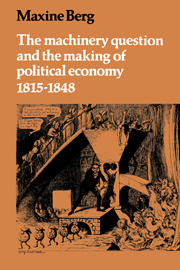Book contents
- Frontmatter
- Contents
- List of Illustrations
- Preface
- Introduction
- PART ONE THE MACHINERY QUESTION
- PART TWO THE POLITICAL ECONOMY OF MACHINERY
- PART THREE A SCIENCE OF MACHINERY
- PART FOUR THE POLITICS OF MACHINERY
- PART FIVE THE SOCIAL CRITICS OF MACHINERY
- 11 Tories
- 12 Radicals
- 13 Social reformers
- EPILOGUE: BEYOND MACHINERY
- Bibliography
- Index
- Frontmatter
- Contents
- List of Illustrations
- Preface
- Introduction
- PART ONE THE MACHINERY QUESTION
- PART TWO THE POLITICAL ECONOMY OF MACHINERY
- PART THREE A SCIENCE OF MACHINERY
- PART FOUR THE POLITICS OF MACHINERY
- PART FIVE THE SOCIAL CRITICS OF MACHINERY
- 11 Tories
- 12 Radicals
- 13 Social reformers
- EPILOGUE: BEYOND MACHINERY
- Bibliography
- Index
Summary
The critique of political economy among Tory and radical writers went with a challenge to the process of industrialisation. The persistence of this disturbing and unharmonious reaction evoked two main types of response among the middle classes, the first of which was to look to political economy for intellectual guidance and reassurance, and the second to recognise the significance of the challenge by calling for social reform. I have shown how political economists themselves responded to this need. But the truths of political economy were also marshalled and dispensed in a popular form for an avid middle-class audience, and for the not so avid upper- and lower-class heretics who needed to be converted.
R. K. Webb in his The British Working Class Reader 1790–1848 has gathered and summarised many of the tracts of popular economics relating to agricultural riots and machinery, the New Poor Law, and trade unions. He describes how political economy became a potent doctrine in the hands of its popularisers by constantly conveying in a simplified form six principal points. The first was a mechanistic view of political economy which presented abstractions like ‘labour’ and ‘capital’ without human or social dimensions. The second was a central concern with problems of production and with disseminating the view of the absolute benefits of machinery. The third was freedom of all markets. The fourth and the fifth were the Malthusian population principle and the ‘iron law’ of wages, that wages were paid out of a fixed fund. The last was class harmony between middle and working classes in order to forward the accumulation of capital.
- Type
- Chapter
- Information
- Publisher: Cambridge University PressPrint publication year: 1980



